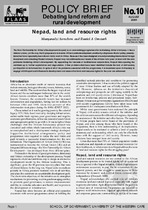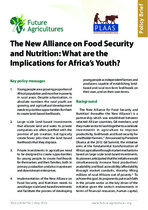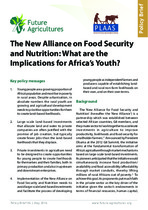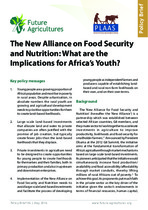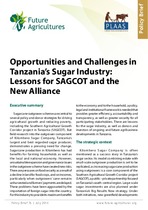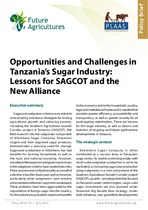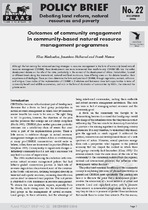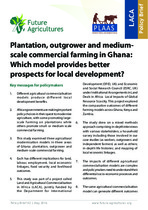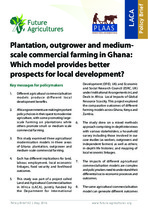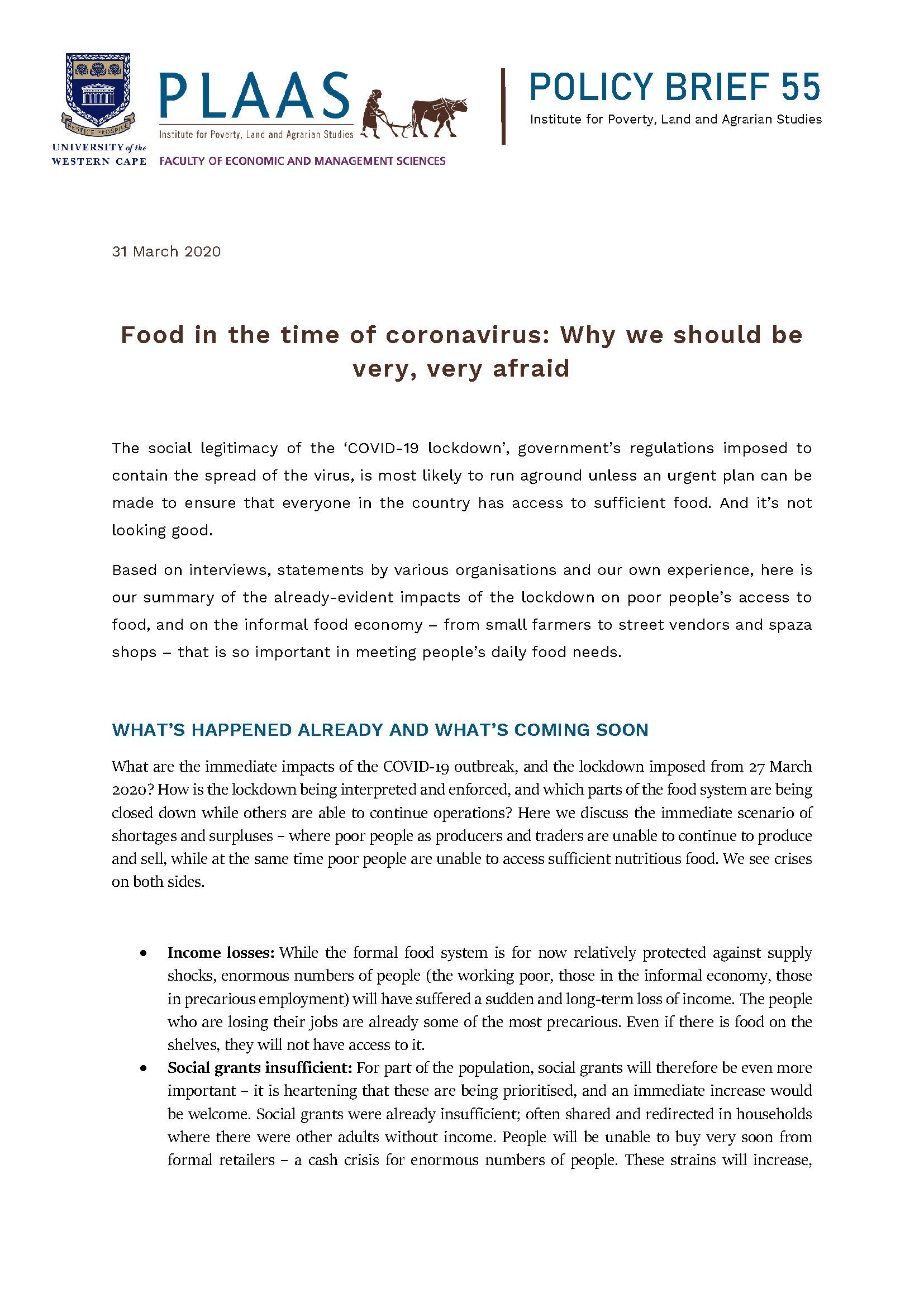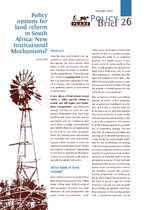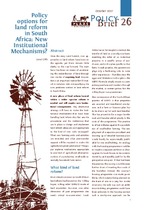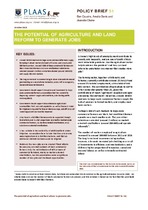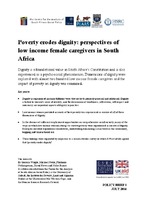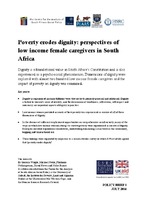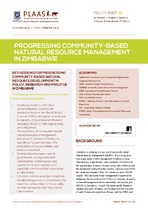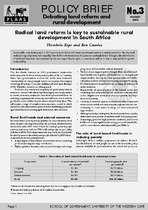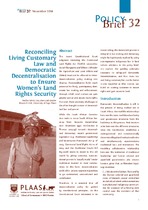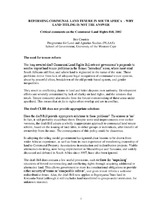Browsing Policy Briefs by Title
Now showing items 73-92 of 144
-
Nepad, land and resource rights
(Institute for Poverty, Land and Agrarian Studies, University of the Western Cape, 2004)The New Partnership for Africa’s Development (Nepad) is an overarching programme for revitalising Africa’s fortunes. It has a visionary tone, yet the way that it proposes to overcome Africa’s underdevelopment uncritically ... -
The New Alliance on food security and nutrition: What are the implications for Africa’s youth?
(Institute for Poverty, Land and Agrarian Studies, University of the Western Cape, 2016)The ‘New Alliance for Food Security and Nutrition’ (hereafter the ‘New Alliance’) is a partnership which was established between selected African countries, G8 members, and the private sector to ‘work together to accelerate ... -
The New Alliance on Food Security and Nutrition: What are the Implications for Africa’s Youth?
(Institute for Poverty Land and Agrarian Studies (PLAAS), 2016)The ‘New Alliance for Food Security and Nutrition’ (hereafter the ‘New Alliance’) is a partnership which was established between selected African countries, G8 members, and the private sector to ‘work together to accelerate ... -
The new alliance on food security and nutrition: what are the implications for Africa’s youth?
(Future Agricultures Consortium, 2016)Young people are a growing proportion of Africa’s population and most live in poverty in rural areas. Despite urbanisation, in absolute numbers the rural youth are growing and agricultural development needs to prioritise ... -
Opportunities and challenges in Tanzania’s sugar industry: Lessons for SAGCOT and the New Alliance
(Institute for Poverty, Land and Agrarian Studies, University of the Western Cape, 2014)Sugarcane outgrower schemes are central to several policy and donor strategies for driving agricultural growth and reducing poverty, including the Southern Agricultural Growth Corridor project in Tanzania (SAGCOT). But ... -
Opportunities and challenges in Tanzania’s sugar industry: Lessons for SAGCOT and the New Alliance
(Institute for Poverty Land and Agrarian Studies (PLAAS), 2014)Sugarcane outgrower schemes are central to several policy and donor strategies for driving agricultural growth and reducing poverty, including the Southern Agricultural Growth Corridor project in Tanzania (SAGCOT). But ... -
Outcomes of community engagement in community-based natural resource management programmes
(Institute for Poverty, Land and Agrarian Studies, University of the Western Cape, 2006)Although the last century has witnessed exciting strategies in resource management in the form of community-based natural resource management (CBNRM), these developments are more incremental than revolutionary. CBNRM falls ... -
Plantation, outgrower and medium- scale commercial farming in Ghana: Which model provides better prospects for local development
(Institute for Poverty Land and Agrarian Studies (PLAAS), 2016)There has been a sustained push for agricultural commercialisation in developing countries. In Africa, this has been pursued in different ways over time. During the colonial era, most governments believed that plantations ... -
Plantation, outgrower and medium-scale commercial farming in Ghana: which model provides better prospects for local development?
(Institute for Poverty, Land and Agrarian Studies, University of the Western Cape and Future Agricultures Consortium, 2016)African governments are making important policy choices in their quest to modernise agriculture, with some promoting largescale farming on plantations while others promote small- or medium-scale commercial farming. -
Plantation, outgrower and mediumscale commercial farming in Ghana: Which model provides better prospects for local development?
(Institute for Poverty, Land and Agrarian Studies, University of the Western Cape, 2016)There has been a sustained push for agricultural commercialisation in developing countries. In Africa, this has been pursued in different ways over time. During the colonial era, most governments believed that plantations ... -
Policy Brief 55: Food in the time of coronavirus: Why we should be very, very afraid
(Institute for Poverty, Land and Agrarian Studies, 2020-04-01)The social legitimacy of the ‘COVID-19 lockdown’, government’s regulations imposed to contain the spread of the virus, is most likely to run aground unless an urgent plan can be made to ensure that everyone in the country ... -
Policy options for land reform in South Africa: New Institutional Mechanisms?
(Institute for Poverty, Land and Agrarian Studies, University of the Western Cape, 2007)Since the 2005 Land Summit, new approaches to land reform have been on the agenda, yet there remains little clarity on the way forward. The main focus has been on means of accelerating the redistribution of land ... -
Policy options for land reform in South Africa: New institutional mechanisms?
(PLAAS, University of the Western Cape, 2007-10)Since the 2005 Land Summit, new approaches to land reform have been on the agenda, yet there remains little clarity on the way forward. The main focus has been on means of accelerating the redistribution of land through ... -
The potential of agriculture and land reform to generate jobs
(Institute for Poverty, Land and Agrarian Studies, University of the Western Cape, 2018)Extremely high levels of unemployment contribute to poverty and inequality, and are one of South Africa’s most intractable problems. Can the agricultural sector help to address the problem? And how can land reform be ... -
Poverty erodes dignity: perspectives of low income female caregivers in South Africa
(Institute for Poverty, Land and Agrarian Studies, University of the Western Cape, 2014)The Universal Declaration of Human Rights introduces the recognition of the inherent dignity of all people as a foundation of freedom, justice and peace in the world. Dignity plays a prominent role in South Africa’s ... -
Poverty erodes dignity: perspectives of low income female caregivers in South Africa
(Institute for Poverty Land and Agrarian Studies (PLAAS), 2014)Dignity is a foundational value in South Africa’s Constitution and is also experienced as a psycho-social phenomenon. Dimensions of dignity were explored with almost two hundred low income female caregivers and the impact ... -
Progressing community-based natural resource management in Zimbabwe
(Institute for Poverty, Land and Agrarian Studies, University of the Western Cape, 2014)Zimbabwe is ushering in a new era of community-based natural resource management (CBNRM). It is moving away from place-based wildlife management initiatives to more internationally linked forestry carbon projects which ... -
Radical land reform is key to sustainable rural development in South Africa
(Institute for Poverty, Land and Agrarian Studies, University of the Western Cape, 2002)Sustainable rural development in 21st century South Africa will never be achieved without a radical assault on the structural underpinnings of poverty and inequality inherited from three centuries of oppression and ... -
Reconciling living customary law and democratic decentralisation to ensure women’s land rights security
(Institute for Poverty, Land and Agrarian Studies, University of the Western Cape, 2010)The recent Constitutional Court judgment rendering the Communal Land Rights Act (CLARA) unconstitutional (Tongoane and Others v Minister for Agriculture and Land Affairs and Others) must not be allowed to throw dec ... -
Reforming communal land tenure in South Africa – Why land titling is not the answer
(Institute for Poverty, Land and Agrarian Studies, University of the Western Cape, 2002)The long-awaited draft Communal Land Rights Bill sets out government’s proposals to resolve urgent land tenure problems in the former ‘homeland’ areas, where most rural South Africans still live, and where land is ...

